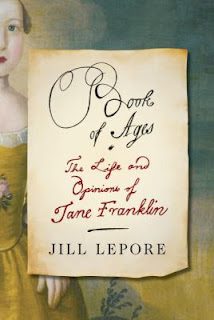.jpeg) Benjamin Franklin (1706-1790) was the fifteenth of seventeen children of Josiah Franklin. The last of the children was his sister Jane Franklin (1712-1794), of whom little has ever been written. Unlike her famous brother, she spent almost her entire life in Boston dealing with family matters and making soap. She was married at age 15 to Edward Mecom, who proved to be a poor provider and unstable character. He eventually landed in debtor's prison, losing the family home, forcing Jane to move with their children in with her parents. Many of their children and grandchildren also proved to be sickly or unstable, and the industrious Jane outlived most of them. We would know nothing about her today if it were not for her life-long correspondence with her brother Benjamin. Using their remaining letters, noted historian Jill Lepore has written about Jane in The Book of Ages: The Life and Opinions of Jane Franklin.
Benjamin Franklin (1706-1790) was the fifteenth of seventeen children of Josiah Franklin. The last of the children was his sister Jane Franklin (1712-1794), of whom little has ever been written. Unlike her famous brother, she spent almost her entire life in Boston dealing with family matters and making soap. She was married at age 15 to Edward Mecom, who proved to be a poor provider and unstable character. He eventually landed in debtor's prison, losing the family home, forcing Jane to move with their children in with her parents. Many of their children and grandchildren also proved to be sickly or unstable, and the industrious Jane outlived most of them. We would know nothing about her today if it were not for her life-long correspondence with her brother Benjamin. Using their remaining letters, noted historian Jill Lepore has written about Jane in The Book of Ages: The Life and Opinions of Jane Franklin.Readers might expect an eighteenth century woman of limited means, education, and travel not to be noteworthy. Not Jane. She borrowed books and newspapers and stayed informed about colonial affairs, always watching for news of her brother. He sent her numerous books that she read and sometimes critiqued in her letters back to him. Though not in position to meet and correspond with wealthy women, such as Abigail Adams and Martha Washington, she expressed some of their common concerns. She too thought that the Continental Congress and the writers of the Constitution should, as Adams said to her husband, "consider the ladies."
Because most of what we know of Jane Franklin comes from the Benjamin Franklin sources, Book of Ages is primarily about their relationship. Though he assisted her on numerous occasions, directing his business partners to transfer rental properties to her, readers may wish that he had done more to help. With communications and transportation so slow, the brother and sister were sometimes out of touch for years when she could have used him. Her survival through some really hard times is a testament to her tenacity.
Book of Ages may look like a really big book about a relatively unknown character, but readers will find that nearly half the volume is the appendix with its notes, genealogies, a calendar of letters, and a description of Jane's library collection. Much of this is worth reading after finishing the main text.
I was lucky enough to get a copy of an uncorrected proof of Book of Ages at the American Library Association's Carnegie Awards ceremony, where Lepore's was a finalist for her wonderful book The Mansion of Happiness. Book of Ages will be in libraries and bookstores in October.
Lepore, Jill. Book of Ages: The Life and Opinions of Jane Franklin. Knopf, October, 2013. 480p. ISBN 9780307958341.



No comments:
Post a Comment